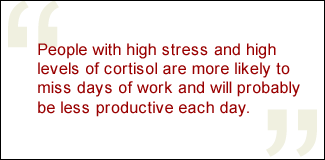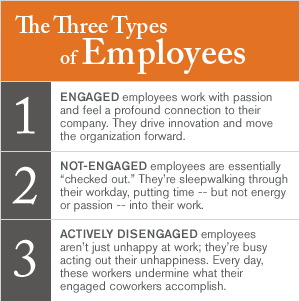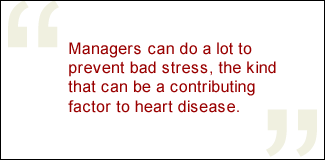The high cost of health insurance has prodded many American businesses to use creative strategies to encourage healthier habits among employees, from on-campus gyms and weight-loss programs to healthy food in the cafeteria; some businesses even employ on-site nurses.
But wellness programs can't be mandated, nor can good health. There's only so much an organization can do to promote healthy habits among employees. Furthermore, it's an uphill battle: As workers age, they become more expensive to insure and treat. But recent research suggests that business may be overlooking an important cause of ill health and high insurance costs: workplace stress.
We all know that stress can be hard on one's health, but recent research suggests it can actually be deadly. James K. Harter, Ph.D., ║┌┴¤═°'s chief scientist of workplace management and well-being, has been studying well-being and the workplace for the past 20 years, and some of the recent research on the workplace and health has astonished even him. One finding that has grabbed his attention: Workplace stress apparently can be linked to heart disease -- the number-one cause of death in American men and women over 35 -- in a large proportion of workers. Worse yet, heart disease in these employees is separate from other health factors, such as weight, diet, smoking, or family history.
Considering the billions of dollars business invests in health insurance and the negative impact on revenue from lost productivity and absenteeism due to employee illness, reducing stress should be a crucial focus for any organization. Dr. Harter thinks that there's an often-overlooked answer: workplace engagement. He bases his theory on what ║┌┴¤═° research has uncovered about the connection between the quality of the workplace and stress and what scientists are learning about stress and illness. In this interview, Dr. Harter discusses the connection between health, engagement, and profitability -- and what managers can do to increase all three. Read on -- it'll do your heart good.
GMJ: What effect does physical well-being have on psychological well-being in the workplace?
Dr. Harter: Well, there have been a few studies on that, and researchers are finding that there's a significant interaction between work stress and health. In other words, if people are in an ongoing work situation that is negative or stressful, they have a higher potential for negative health consequences.
There's still a lot of work to do to understand the connection between work stress and health problems. That's why we need to dig into it and study it in more depth, so we can help organizations understand why doing what you do every day has an effect on worker health.
We already know that engagement is related to organizational outcomes like profitability and workgroup productivity, retention, and absenteeism -- all of which have an impact on the bottom line of an organization. [See "Feedback for Real" and "Taking Feedback to the Bottom Line" in the "See Also" area on this page.] So understanding the linkages between well-being, health, and engagement is particularly important. I think we could understand that at an even more granular level as we learn more about psychobiology.
 |
GMJ: So what are the relationships between health, stress, and engagement?
Harter: Scientists in our field are finding very substantial relationships. People who are engaged in their work have much lower self-reported stress than those who are disengaged.
A recent study in Germany, reported in Psychosomatic Medicine, for example, suggests that cortisol levels are higher among people with high self-reported levels of stress at work in comparison to people with lower self-reported stress. Cortisol, which is secreted by the adrenal glands, is a hormone necessary for the functioning of almost every one of our body parts. It's released in response to physical or psychological stress. Too much or too little leads to a variety of physical health symptoms and disease states. Extreme stress causes higher than needed levels of cortisol to be released.
Studying cortisol levels in the body is one way scientists can objectively measure stress and its consequences to one's physiology. In particular, the research in Germany revealed connections between chronic work stress and morning cortisol levels. People with high stress and high levels of cortisol are more likely to miss days of work and will probably be less productive each day.
We also know that people with poor work environments report more stress. If you're not as engaged in your work, you're less likely to be productive, and you're less likely to help the organization achieve the outcomes it wants to achieve. You may be less able to function in a team context.
We don't know yet if stress causes disengagement or if stress is a result of disengagement. There's a lot to study. But research suggests that the quality of the workplace can have a direct impact on the stress that people feel, which subsequently affects cortisol levels, which could then contribute to health problems like heart disease. It isn't a one-to-one formula, but the workplace and stress seem inseparable. There are many potential ramifications for organizations, including healthcare costs and lost productivity.
 |
GMJ: So how stressed is work making us?
Harter: In the United States, 30% of the working population reports that there have been three or more days in the last month when the stress of work has caused them to behave poorly with family or friends. Among actively disengaged employees, an alarming 54% agreed that work stress had caused them to behave poorly with family or friends, while only 17% of engaged employees reported that stress had caused them to behave poorly. The percentages are similarly high in other countries. [See Sidebar "The Three Types of Employees" and the articles "At Work, Feeling Good Matters," "Engagement Keeps the Doctor Away," and "Bringing Work Problems Home" in the "See Also" area on this page.]
GMJ: What are the linkages between stress, cortisol, and heart disease?
Harter: There's an interesting study from England that was recently reported in Archives of Internal Medicine. Researchers looked at 6,442 men in civil service departments who had no prevalent coronary heart disease at the baseline of the study. The researchers measured various aspects of the work environment directly related to quality of management, including getting criticized unfairly by their boss, getting information from their boss, how often their boss was willing to listen to their problems, and how often they received praise for their work, things like that.
Then they tracked the incidence of coronary heart disease for an average of 8.7 years and found a 30% lower likelihood of coronary heart disease for employees with positive perceptions of their work environment compared to those with unfavorable perceptions of their work environment. The findings remained consistent even when the researchers controlled for age, ethnicity, marital status, educational attainment, socio-economic position, cholesterol level, obesity, hypertension, smoking, alcohol consumption, and physical activity.
This 30% difference in coronary heart disease incidence is just shockingly important when you consider that ║┌┴¤═° research, which covers 4.5 million employees in 112 countries, indicates that fewer than one in every two employees feels strongly that they have a supervisor at work who cares about them as a person. And fewer than one in every three employees feels strongly that they have someone at work who encourages their development.
GMJ: So a major explanation for the 30% difference in who got heart disease was a bad workplace?
Harter: The research would seem to suggest that. Thirty percent is a much higher percentage than I would have guessed. The questions that people will instinctively ask are: Is the difference just due to the fact that these people have difficult lives in general? Don't they take care of themselves? Are these people just fatalistically flawed in some way? But the researchers actually controlled for the many other known predictors of heart disease. They found that in addition to all these other factors that are typically examined, the workplace environment contributed 30% to the risk of heart disease. That's a lot.
 |
GMJ: How many people are affected by heart disease?
Harter: According to various sources, every minute, one American dies from a coronary event related to coronary heart disease. Thirteen million Americans have heart disease, and many more are at risk of getting it. And it's expensive to treat: Heart disease costs the American economy billions of dollars a year. And it's the leading cause of death for all Americans 35 and older, men and women.
GMJ: So what control do managers have? What can they do to reduce these risks?
Harter: They can do a lot to prevent bad stress, the kind that can be a contributing factor to heart disease -- or, as the study in England suggests, the kind that can cause it in some people. ║┌┴¤═° research has found that managers have direct influence over whether people are praised, whether people feel appreciated, whether people get the information they need to do their jobs. Managers can create environments that facilitate independent thinking and teamwork. These are all factors that managers often control -- and even if they don't have direct control over them, they can influence people who do have control of them. So managers control or can influence the factors that create productive employees; they also control or can affect the things that keep employees engaged, lower employees' stress, and can keep health costs down in their companies. [See "How Managers Trump Companies" in the "See Also" area on this page.]
GMJ: Well, that's kind of a God-like position, isn't it?
Harter: Kind of. We've known that managers are profoundly important in the workplace. For example, when we do research for the first time in an organization, we find wide variation in engagement levels from workgroup to workgroup, and we also find wide variation in productivity from workgroup to workgroup. Some day, I think we'll know how much variation exists on things like cortisol levels and heart disease risk and other factors; this early research indicates that managers may have a direct bearing on that as well. We do know that engaged employees have 27% fewer unexcused absences than actively disengaged ones, and that's a big sum in lost salary -- salary that isn't turned into productivity in organizations.
GMJ: So what can you do if you think that your manager is giving you a heart attack -- literally?
Harter: Well, you can either realize the importance of the relationship with your manager and confront the issues that are causing stress in your life, or you can get a different manager. You might realize that your relationship with your manager affects things other than just your work. It may affect your health. That may stimulate some people to redefine their relationship with their manager or to find a different manager. In fact, many employees do find another manager: Employee turnover is substantially higher for poor versus good managers.
Organizations need to take the workplace environment and the quality of employee/manager relationships seriously, because the health of employees may have an enormous effect on the bottom line in lost productivity, absenteeism, and insurance costs.
GMJ: What should senior executives do if they know some of the managers under them are creating disengaged employees? It might be difficult to go to the CEO and say, "I think some of our managers are killing people."
Harter: [Laughs] I'm laughing because it's such a strong statement, but it could be true. One of the things we found is that there is a cascade effect in organizations. If you're a manager of managers, your level of engagement has a relationship to the level of engagement of the people you manage, which then has a relationship to the engagement of the people they manage. So if you're a manager of managers, you can set the tone. You can have an effect on whether the culture is positive -- whether the culture promotes engagement. Through example, you can show that it's important to praise people when they do good work or that it's important to give people the right tools for the task when you ask them to do something.
As a side note, we found that the Q12 item with the highest relationship to stress at work might seem like the most boring of the questions -- "I have the materials and equipment I need to do my work right." [The Q12 is ║┌┴¤═°'s 12-item employee engagement survey.] But if you think about it, that statement provides important clues to employee engagement and employee stress. Think about the last time you were asked to complete an important task, but you weren't given the materials you needed to do the work right. You probably thought something like, "Okay, they asked me to do this job, and I want to do it, but they're not giving me what I need to do it. They're tying my hands." That can cause enormous stress.
So I think that managers of managers can have a direct bearing on promoting employee engagement -- and preventing stress -- because they're in charge of getting employees what they need and providing other crucial kinds of employee support. How they manage their managers sets an example for how the rest of the organization should function.
GMJ: A lot of companies have wellness programs -- gyms and diet programs are two examples. Do you think that programs like these have as much or more impact on health than increasing workplace engagement would? If you have a limited amount of dollars, where do you put them?
Harter: I think both are important. I can't tell you which has more importance because the research has shown that both are important, and we're still learning about how each one contributes independently, but they interact considerably. Both require that someone take action. I think that there are ways that organizations can encourage people to take care of themselves. There's a lot of potential for creative thinking in this area.
In any case, whether you're a manager in a position to increase engagement in the workforce or an employee who can influence engagement within your own role, you need to take engagement -- and stress -- seriously. Executives and managers want to help their company reach their financial goals, and many employees do as well. But to tell people that the quality of the workplace may affect their risk of coronary heart disease . . . well. It hits home a little quicker. And that's one area where scientists should focus future research.
-- Interviewed by Jennifer Robison
|
Additional Reading Schlotz, W., Hellhammer, J., Schulz, P., and Stone, A. (2004) "Perceived work overload and chronic worrying predict weekend-weekday differences in the cortisol awakening response." Psychosomatic Medicine, 66, 207-214. Kivim├Ąki, M., Ferrie, J., Brunner, E., Head, J., Shipley, M., Vehtera, J., and Marmot, M. (2005). "Justice at work and reduced risk of coronary heart disease among employees." Archives of Internal Medicine, 165, 2245-2251. |
